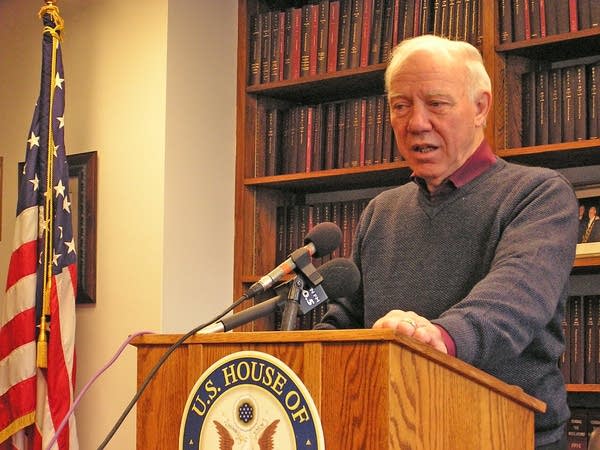Not all favor restoring Clean Water Act
Go Deeper.
Create an account or log in to save stories.
Like this?
Thanks for liking this story! We have added it to a list of your favorite stories.

It's called the Clean Water Restoration Act and Rep. Jim Oberstar says it clarifies the federal Clean Water Act. The original Clean Water Act passed in the 1970s, gave the federal goverment authority over navigable waters.
The Supreme Court ruled the federal government overreached the definition of a navigable water. Oberstar wants to change the law to give federal jurisdiction over all waters of the United States.

That has Dennis Fink, a St. Louis County Commissioner, very concerned. Fink serves on a clean water taskforce for the National Association of Counties and says Oberstar's legislation will give the federal government far too much authority over state and local governments.
"The environmental community will tell you this is all about clean water. But the fact of the matter is giving the federal government more jurisdiction than they have does not mean you will clean the water up," Fink says. "What it means is you will have one size fits all. And what we've already found when the wetlands act of 1991 was put together in Minnesota, that one size even in Minnesota doesn't fit all."
Turn Up Your Support
MPR News helps you turn down the noise and build shared understanding. Turn up your support for this public resource and keep trusted journalism accessible to all.
Fink says broad federal jurisdiction over all lakes, streams and wetlands, would paralyze local governments.
Some county officials seem to agree with that, including Polk County Commissioner Warren Affeldt. Affeldt has farmed for years in the Red River Valley. He says under Oberstar's bill, farmers would need federal permits to clean a drainage ditch. Affeldt says if the legislation is passed, in 20 years, northern Minnesota will be a giant swamp.
"I live out in the country and I like to go out and take a tinkle by my trees once in a while. I'm afraid I won't even be able to do that."
"This has got to end, it has to end. We can't give up on this. We have to stop this," Affeldt says. "I live out in the country and I like to go out and take a tinkle by my trees once in a while. I'm afraid I won't even be able to do that."
Affeldt says the act is a clear threat to private land owners' rights.
A Washington lobbyist told local officials they're right to be worried about the legislation. R.J. Smith works for the National Center for Public Policy Research and he contends the Oberstar legislation is an attempt to wrest control from private landowners.
"He's pulled a real con job on the American public. It's like a carnival shell game, because he calls this act the Cleanwater Restoration Act. But he's not restoring anything," Smith says. "What he's trying to do is eliminate the constitution and eliminate the Supreme Court decisions."
Rep. Oberstar says those concerns are flat wrong. Oberstar says his legislation simply clarifies a law that's become muddied by legal wrangling. He says anyone who opposes his legislation wants to turn back the clock on environmental protection.
"There are groups that simply do not want the Clean Water Act enforced. They fundamentally disagree with protecting the nation's waters, its wetlands, its watersheds. They don't want to do that," he says.

Oberstar says his legislation provides exemptions to protect agriculture, forestry and mining from federal bureauracracy. One person spoke in support of Oberstar's bill. Bob Tammen, a resident of Soudan, Minnesota, told county commissioners they're not always the best choice to protect wetlands.
"If I were on the county board and my neighbor came over and said, 'Bob, I really need to fill this wetland.' Could I say, 'no?' It's pretty hard to look your neighbor in the eye when there's short term financial gain and say, 'No you can't do that.' The economic forces are short term. The water we drink, the air we breath, that's long term," Tammen says.
This is the first of four public hearings designed to give property owners and local officials a chance to weigh in on Representative Oberstar's proposal. Everyone appears to agree they want to protect lakes, streams and wetlands. The disagreement is over who should should have authority to make sure it happens.






